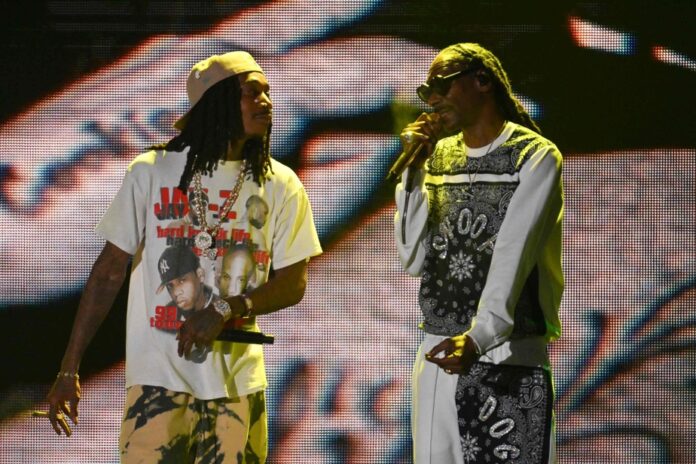(New York) Thousands of people celebrated the 50th anniversary of hip-hop until late Friday at a mega-concert in the Bronx given by pioneers of the genre, such as Run-DMC, Nas and Snoop Dogg, in an overheated Yankee Stadium.
For more than eight hours, New Yorkers and tourists celebrated with demonstrative joy five decades of music born on August 11, 1973, whose immense influence would irreparably shake the culture and the music industry.
“I had no idea how monumental it was going to be when it started,” said the legendary 46,000-seat baseball team Kiesha Astwood, 50, born as hip-hop in 1973 and on Sedgwick Avenue, in the Bronx.
This is where on the ground floor of a low-rent housing building at 1520 Sedgwick Avenue, in one of New York’s five boroughs, a Jamaican-born DJ, Clive Campbell, aka DJ Kool Herc, innovates: by spinning the same record on two turntables, he isolates the sequences of rhythms and percussion and makes them last in the speakers, foreshadowing the “breakbeat”, an essential component of hip-hop.
“It’s super invigorating,” enthused Kiesha Astwood to AFP as Kool Herc received accolades on stage for her key role. “Here we are 50 years later.”
During this marathon concert, the stars of the genre followed one another to chain hits like Run-DMC and its It’s Tricky, collecting the screams of an audience overwhelmed with happiness.
Another veteran, Nas played him a series of tracks from his seminal album Illmatic, including The World Is Yours and N.Y. State of Mind.
A roar rose from the crowd when the New York icon closed her set by inviting Lauryn Hill on stage to sing the track they collaborated on If I Ruled the World (Imagine That) as well as her own single Doo Wop (That Thing) and his rendition of Killing Me Softly, originally sung with the Fugees.
Snoop Dogg picked out some of his fan favorites like The Next Episode, Nuthin’ But A’G’Thang and Gin And Juice.
Lil Wayne, The Sugarhill Gang, members of the Wu-Tang Clan and Ice Cube, were also part of the show, all Melle Mel or even Scorpio with Grandmaster Caz.
“I think hip-hop has really given a voice to people who didn’t have a voice at the start,” summed up Antoine Crossley, who came specially from Chicago.
This concert was the culmination of a series of events. New York has flourished a number of cultural initiatives all summer long: graffiti or breakdance sessions, “block parties”, concerts…
For some critics and fans, giving an official date for the birth of a style of music, which in fact already existed before August 11, 1973, seems a bit arbitrary.
But perhaps no other type of music deserved to celebrate its birth. For decades, hip-hop has been maligned, ignored and censored by an industry it has helped to profoundly shape, in a country where rappers have produced massive hits and had a huge impact on everything from music fashion, through language and dance.
When life was harsh and violent in New York, the first “block parties”, parties, offered young African-Americans an escape from poverty and discrimination. Hip-hop then spread to the four corners of the planet and most countries now have their own scene.
In the audience, from children to grandparents danced, sang, and made the night sparkle in the light of their cell phones.
But as the hours passed, some joked that they were aging like hip-hop itself. “All the people sitting there are over 30, we have a little sore knees around here,” admitted one.
Fans who had the stamina to stick it out could see Nas bring DJ Kool Herc back on stage for another round of thanks. “It’s our love, our lineage,” he said. “Hip-hop was born for you and me, and we are where we need to be. At New York “.















